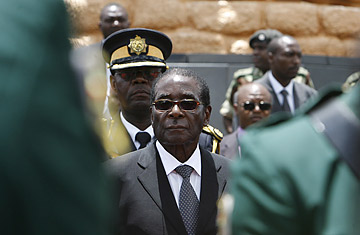
Robert Mugabe is pushing for a vote in Zimbabwe.
Good guys like elections. Bad guys fix or nix them. Or so goes the thinking that underpins much of Western foreign policy. But in Zimbabwe, it appears to be the other way around right now: hardline President Robert Mugabe is pushing for a vote while his pro-democracy rival, Morgan Tsvangirai, is dragging his feet. What gives?
Mugabe is not many people's idea of a democrat. But after three decades of allegations that his party members have beat up the opposition, tampered with ballots and ignored previous election results, the 85-year-old autocrat appeared to change tack in December by calling for a new general election. Though he did not set a date, Mugabe said a vote was "not far off." The 11-month-old government of national unity, in which he serves as President and Tsvangirai, head of the Movement for Democratic Change (MDC), serves as Prime Minister, has "lived more than half its life," Mugabe told the annual conference of his Zimbabwean African National Union-Patriotic Front (ZANU-PF). His party should prepare for a fresh vote, he said, in a spirit of "never [surrendering] your birthright."
An election should be good news for Tsvangirai. Though political support is hard to gauge in a country as repressive as Zimbabwe, most international observers estimate that popular support for Zanu-PF runs only at about 10%. A clear victory for one party would also be good for the country, not least because it would bring to an end a coalition government that has been deadlocked and non-functioning since it was formed last February. South African President Jacob Zuma, who has acted as the mediator between the two sides, also backs the idea of a poll. On Jan. 17, his spokesman Vincent Magwenya said Zuma was "looking forward to an election in 2011" and encouraging both sides to "park" outstanding disagreements so a vote could take place.
But Tsvangirai has come out against an election. In an interview with TIME earlier this month, the former trade union leader rejected any vote before both sides decided on a new constitution. Only after a draft is agreed upon and put to a referendum — the process set out in the agreement under which Mugabe and Tsvangirai agreed to share power — would elections be possible, he said. "People should not preempt process ... which is understood by all parties to be the law," he added.
The situation is more, and less, complicated than it seems. On the one hand, both Mugabe and Tsvangirai find themselves fighting from unaccustomed corners, but on the other, their underlying motivations have not changed. Mugabe's one guiding principle remains to hold on to power. Having already survived a number of elections that went against him, he is likely calculating that a vote under the present rules is better than changing the rules altogether. This is also why Tsvangirai is insisting that the rules be altered. He wants a new government set-up in which the head of state —himself, Mugabe or anyone else — doesn't have such tight control over the country's security forces.
Tsvangirai is probably trying to avoid a repeat of the 2008 presidential and parliamentary elections. The MDC leader claimed victory in the poll, but a government electoral body said that he hadn't won enough votes to avoid a run-off. Security forces under Mugabe's control then allegedly unleashed a series of vicious attacks on MDC members, leaving some 100 people dead and causing Tsvangirai to drop out of the run-off days before the vote. Mugabe was declared the winner, but the resulting international outcry was so great, he later agreed to share power Tsvangirai.
Logical as Tsvangirai's position might be, that won't stop Mugabe from painting him as being scared of elections. John Makumbe, a political lecturer at the University of Zimbabwe, says that "Zanu-PF is the last party that would want an election — and [the last party] that would win it." On the other hand, Mugabe is not going to miss a chance to "play to the gallery," he adds. Eldred Masunungure, a professor of political science at the same university, says the world needs to understand that a fair election is still impossible in Zimbabwe. "[Zanu-PF's] structures of violence are still intact," he says. "A free and fair election is not a reality. That's why Tsvangirai does not want to talk elections. Most of his supporters wouldn't participate. They're still in their shells."
Masunungure adds that Zuma is in favor of a new election because it sounds good and appears to be "the quickest way to get rid of the Zimbabwean crisis." But the temptation must be resisted, he warns. Those who doubt him might listen to Zanu-PF spokesman Ephraim Masawi, who said recently that his party was "raring" for fresh elections. "Our structures are already mobilizing supporters so that we win the next elections," he said. "Zimbabweans have realized that we have to do away with [other] parties." Just as Mugabe is an unlikely democrat, Zanu-PF's idea of an election remains a little different from most.
